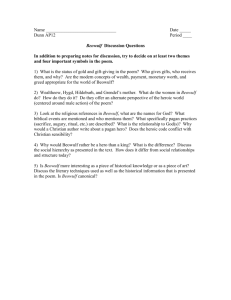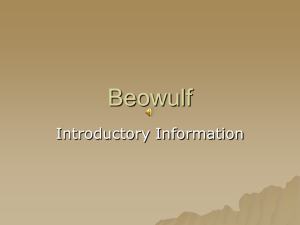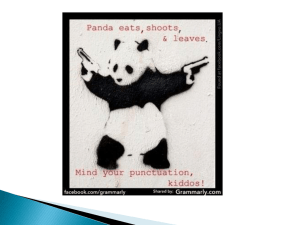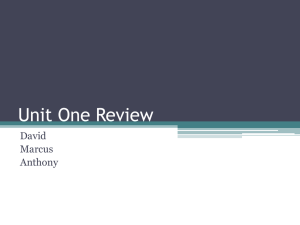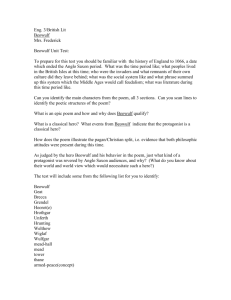ENGLISH LITERATURE
advertisement
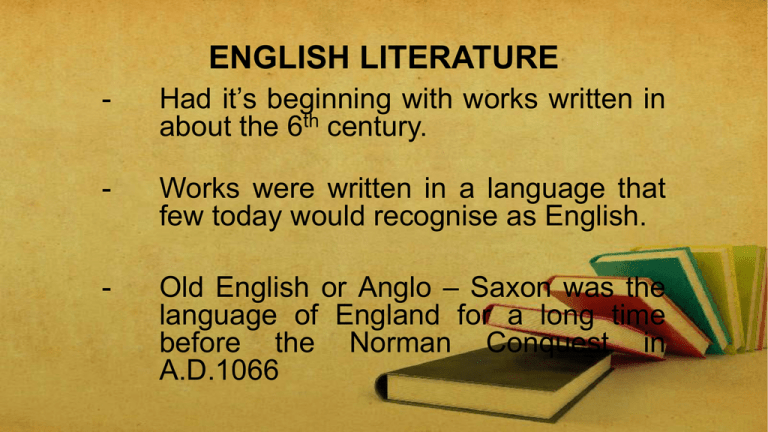
ENGLISH LITERATURE - Had it’s beginning with works written in about the 6th century. - Works were written in a language that few today would recognise as English. - Old English or Anglo – Saxon was the language of England for a long time before the Norman Conquest in A.D.1066 OLD ENGLISH LITERATURE - The study of English literature usually begins with the Anglo – Saxon epic poem Beowulf. - The only manuscript of Beowulf, written down sometime in the 10th century , is preserved in the British Museum in London BEOWULF Setting: Denmark Characters: King Hrogthar, the Dane, Grendel, Beowulf Though Beowulf is an ancient pagan myth lie beneath the story, its heroing stands for Christian virtues. Poems in the Old English Era The Wanderer - a sorrowful journeys of a man driven from his home after the death of his Lord. The Seafarer a dialogue between a youth and an old sailor who talks about hardships and joys of seafaring life. The Battle of Maldon - deal with war OLD ENGLISH WRITERS Caedmon - in the 7th century, wrote a creation hymn, of which only a few lines survive. - his an ignorant shepherd, inspired through visions to sing praises of the creation. Cynewulf - lived into the 9th century. King Alfred(849-99) - is a important figure in Old English literature and the only monarch England has honored as “the Great”. - his interests went beyond his duties as a ruler and warrior. The Anglo-Saxon Chronicle - Foundation stone of English history - Gives the events of English history from the Roman invasion of Britain in 54 B.C. to the middle of the 12th century Venerable Bede - historian - monk - He quoted the lines of Caedmon’s poem. - Wrote in Latin the earliest major prose work in England “The Church History of the English People” MIDDLE ENGLISH LITERATURE - Sees the true beginning of the great heritage of English literature. - Works were written Latin Writers: Geoffrey Monmouth(1100-54) • History of the Kings of Britain - romance as well as history • Brut(Brutus) of Layamon - contains the first account in English of Arthur, as well as King Lear and Cymbeline • Sir Gawain and the Green Knight - a superb poem of unknown authorship Sir Thomas Malory(1471) • Le Morte Darthur “The Death of Arthur” • Morte Arthure Tennyson • The Idllys of the King T.H. White • The Once and Future King William Caxton – the first English printer William Langland • Piers Plowman John Gower • Mirour de l’Omme “Mirror of Man” • Vox Clamantis “The Voice of One Crying” • Confessio Amantis “ The Lover’s Confession” Geoffrey Chaucer (1343 – 1400) - This poet is an experienced man of the world - He enjoyed the favour of three kings • • • Edward III Richard II Henry IV He belonged in the Trio of English poetry giants Chaucer’s Works: The Canterburry Tales – his masterpiece The Parliament of Fowls The Legend of Good Women - supposed dream visions Troilus and Criseyde – romance of the Trojan War Middle English Drama - Religious drama - Was not created for reading - It grew out of faith and life of the era Pagyn – comes the word pageant. - when plays were put on outside, they were often presented on a procession of wagons. Plasterers – groups of merchant and labourer performed certain biblical stories. Miracle Plays - dramas based on saint’s miracles and the biblical miracles. Second Shepherd’s Play - drama about Nativity from the town of Wakefield Morality - a form of allegory. kind of allegory that each character represents a social type or a certain character trait. • Everyman - greatest allegorical plays shows the summoning of Everyman by death. 18th Century - Shift from the mood and tone of 17th century literature. - Age of wit and skepticism. - The first important dictionary of the language was produced. Satire – a form of writing that ridicules human vices and follies, expressed the spirit of the time. Drama Restoration Drama - possessed stored-up energy, for the Puritans had closed all theaters, holding them to be immoral. Restoration Comedies - were comedies of manners / drawing-room comedies. Writer: Dryden(1652-85) Thomas Otway(1652-85) • Venice Preserved Sir George Etherege(1635-91) William Wycherley(1641-1716) Sir John Vanbrugh(1664-1726) William Congreve(1670-1729) • The Way of the World George Farquhar(1678-1707) • The Beaux’ Strategem Both works of Congreve and Farquhar were outstanding. John Gay(1685-1732) - wrote one of the great popular successes of his time. • The Beggar’s Opera - a play with ballads. a tale of cutthroats and highwaymen was really a satire of the government of Sir Robert Walpole, a British prime minister. - Licensing Act 1737 - this act was passed because of Walpole’s anger at satires of Gay and other playwrights. - all theatres were closed except Covent Garden and Drury Lane and all plays were subject to censorship by the government. Oliver Goldsmith(1730-74) • She Stoop to Conquer – successful play • Vicar of Wakefield – one of the best of the 18th century His two long poems: • The Traveller • The Deserted Village Brinsley Sheridan(1751-1816) • The Rivals - was produced Covent Garden in London. • The School for Scandal - - by the his masterpiece still very much alive in the theatre. Poetry Alexander Pope(1688-1744) - most outstanding poet of the first half of 18th century. - He wrote most of his poetry in rhyming couplets. Pope’s Works: • The Rape of the Lock(1712-14) a poem which is a special kind of satirical poem called mock-heroic. • Essay on Criticism • Essay on Man - Both were philosophical poem. - Pope also wrote verse translation of Homer’s Iliad and Odyssey. James Thomson(1700-48) • The Season - his masterpiece • Rule, Britannai - patriotic song William Collins(1721-59) • Ode to Evening William Cowper(1731-1800) - popular for his humorous ballad. • John Gilpin Thomas Gray(1716-71) • Elegy Written in a Country Churchyard Robert Burns(1759-96) Poems: • Tam O’Shanter • To a Mouse • To a Louse Songs: • Comin’ thro the Rye • Auld Lang Syne William Blake(1757-1827) - His a son of a stocking maker. - He did not go to school but was apprenticed to an engraver. • The Tiger comes Experience” • Songs of Innocence from “Songs of Prose Jonathan Swift(1667-1745) - A master of satirical form in prose. • Gulliver’s Travel(1726) 1st Voyage – LILLIPUT (land of tiny people) 2nd Voyage – BROBDINGNAG (land of giants) YAHOOS – filthy creatures HOUYHNHNMS – high-minded horses. Joseph Adison(1672-1719) Sir Richard Steele(1672-1729) • The Tatler(1709- 1711) • The Spectator(1711-1712) Samuel Johnson(1709-84) - a superb critic, a poet, a dictionary maker and possibly the world’s most famous conversationalist. - his greatness was his literary criticism. - known for his critical studies of Shakespeare that are still of value. • London • The vanity of Human Wishes his essays appeared in his twiceweekly publication, the Rambler and in the Idler, a regular section he wrote for a newspaper. • Rasselas, Prince of Abissinia – romance • Journey to the Western Islands of Scotland • Lives of the Poets James Boswell(1740-95) • Life of Samuel Johnson - is one of the greatest biographies in any language or time.

